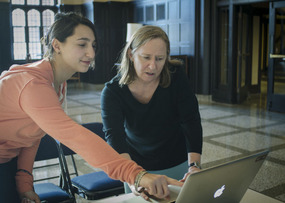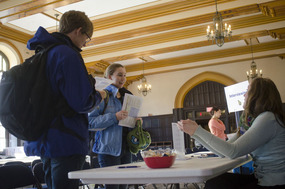It’s hard to blame sophomores for feeling a bit like the middle child of higher education’s student hierarchy.
Freshmen get all the attention as wide-eyed campus newbies while juniors and seniors are entrenched in majors, starting important research projects and being groomed for life beyond Carleton. The pervasiveness of middle child syndrome—and the fear of seeing too many young Carls fall behind because of it—is what prompted campus strategists to craft an entire week of “looking ahead” for sophomores.
The block of seminars and interactive sessions—dubbed “Sophomorphosis: A Week of Transformation,” now in its second year—is designed to take what Carleton was already doing well from an advisory standpoint, but package it in a way that made the information more cohesive and accessible.
“Sophomore year is an interesting time. I think, in general, students are beginning to solidify their sense of selves,” says Louis Newman, associate dean of the college and director of advising. “That first year can be a rough transition. But once you get through it and get your sea legs, once you know how to do academic work at Carleton, it’s time to take it to the next level.”
That next level includes hunting for internships, applying for student leadership opportunities, solidifying majors, exploring study abroad options and unpacking the year-end writing portfolio that all sophomores are required to complete. Among the Carleton offices contributing to Sophomorphosis: the Career Center, Center for Community and Civic Engagement, Off-Campus Studies, Alumni Relations, and the Academic Support Center.
“We have a lot of great resources at Carleton, and taking advantage of them early is better than scrambling,” says Rinya Kamber ‘17, a Chicago native interested in medical school and the reproductive health field. “There are a lot of skills that I know I don’t have yet, and a lot of people ready and willing to help with those skills.”
Kamber acknowledges that her sophomore peers already feel a ton of pressure, and in some instances, have tired of career talk in only their second year of college. But instead of “griping” about the call to action by adults, she has come to realize that academic life at Carleton isn’t enough. Students “need skills, not just everything on paper.”
“I’m kidding myself if I think I can get there alone,” she says. “No matter how much stress this might cause now, not doing this would stress me out more.”
When Matthew Elfstrand ‘17 of Minneapolis finished a summer internship for Mike Obermueller’s congressional campaign, he quickly realized that working in politics was too stressful and precarious for his tastes. Still, trying it out allowed him to “discard that as an option”—a move he’s happy to have made so early.
“Society at large wants those things on your resume that you can reference,” Elfstrand says. “It was a cool experience, but now I know that it’s something I don’t want to do.”
Trial and error is the pulse of Sophomorphosis. Since stakes are lower, sophomores can develop and adjust their master plan while continuing to gain valuable experience with networking, resume building, interviewing and off-campus perspectives.
The availability of Carleton resources allows them to strike early and lean on others to find the best fit. Now, they just have to take advantage.
“Seniors come to know the stakes. They understand how high the stakes are,” says Kathy Evertz, director for the Academic Support Center. “Trying to get the word out to sophomores is much different, even with something fundamental like writing, because they don’t yet understand why the storytelling side is important. (Real life) isn’t like whipping out a paper in one night, you know?”


